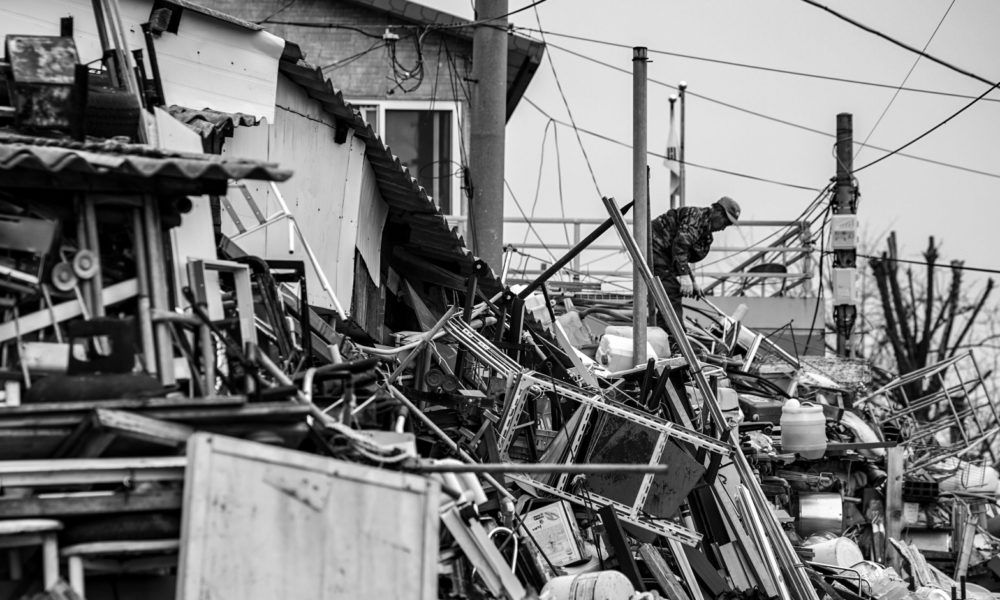A Theology of Catastrophe (Luke 13:1-5)

Have you ever wondered how Christians ought to react to tragic events that transpire right in their lifetime? Consider events like the Boston bombings of 2013, Hurricane Katrina of 2005, and the COVID-19 pandemic of 2019-20. How should a Christian respond and react in the wake of catastrophic events? Jesus’ words in Luke 13:1-5 give a guideline.
There were some present at that very time who told him about the Galileans whose blood Pilate had mingled with their sacrifices. And he answered them, “Do you think that these Galileans were worse sinners than all the other Galileans, because they suffered in this way? No, I tell you; but unless you repent, you will all likewise perish. Or those eighteen on whom the tower in Siloam fell and kills them: do you think that they were worse offenders than all the others who lived in Jerusalem? No, I tell you; but unless you repent, you will all likewise perish.”
How ought the Christian respond to events that result in lives being disturbed and even lost? What is the Christian’s response to catastrophes? An appropriate title for Jesus’ words above might be: A Theology of Catastrophe. In this passage, one gets a glimpse as to how God would have people respond to tragic events that take place in our world.
Here in Luke 13 there is insight given by Jesus as to how we should in part respond to devastating events or catastrophes. In responding to tragic life events there are many appropriate biblical responses that we may take. For instance, believers should weep when lives are lost (Rom 12:15) whether it be a result of acts of wickedness or whether it be the results of a natural disaster.
Who more than Christians value human life? Christians respond to the loss of life with great sadness. Further, more than any other people group, Christians truly understand how tragic death really is because it was not part of the God’s original design.
Therefore, in general, death is a sad and somber thing. But, here in Luke 13, Jesus gave us another response that we may often overlook. In this passage, Jesus taught that tragic death should provoke all people to brokenhearted repentance.
Given the times of the COVID-19 pandemic, Luke 13:1-5 challenges Christians to respond with an eternal perspective as this catastrophic crisis unfolds nation by nation right before our screens. Within these verses, I would like you to see three things: (1) The Catastrophe Report (v.1), (2) The Catastrophe Perception (v.2), and (3) The Catastrophe Response (vv.3-5).
The Catastrophe Report (v.1)
Luke informed us in verse 1 that, “There were some present at that very time who told him about the Galileans whose blood Pilate had mingled with their sacrifices.” The phrase, “That very time,” refers to the time that Jesus was preaching amidst a large multitude. As Jesus was ministering to a large crowd on this occasion, He was interrupted by some people in the audience who wanted to report to Him a catastrophic event that had taken place in their midst. What was this event? Precisely, it was a slaughter at the temple.
There happened to be a group of Galileans who journeyed down to Jerusalem for the sake of celebrating the Passover. Upon their entering of the temple to partake in the sacrificing of their animals, there was a group of Roman soldiers who entered immediately behind them. Those soldiers proceeded to kill the Galileans.
This was a brutal act of murder. As one could imagine, this news was far reaching. If there was such a thing like The Jerusalem Chronicle it easily would have made it into the headlines. In addition to making the headlines, it made its way to Jesus on this occasion presented in Luke 13.
The Catastrophe Perception (v.2)
In Jesus’ response given in verse 2, it can be understood how certain persons were processing such an event. Jesus stated, “Do you think that these Galileans were worse sinners than all the other Galileans, because they suffered in this way?” This was an all too common perception amongst the Jews of Jesus’ day. In short, what they believed was that “bad things happen to bad people.”
Thus, in response to the tragic temple event people were saying, “Those Galileans that were slaughtered must have been very, very wicked people.” We find similar logic employed in John 9:1-2, “As He passed by, He saw a man blind from birth. And His disciples asked Him, ‘Rabbi, who sinned, this man or his parents, that he was born blind?’” The assumption made by Jesus’ disciples was someone must have sinned to cause this blindness. That was the only reasonable explanation in their minds. Jesus didn’t agree with this assessment, however. In the Luke 13 account, Jesus corrected this type of over-simplistic thinking and delivered THE message unbelievers must hear in the midst of tragedies.
The Catastrophe Response (vv.3-5)
Jesus responded to the report and the perception of the catastrophe in two unique ways. First, He dispelled the idea that the Galileans who were slaughtered in the temple suffered such a fate because they were worse sinners than others. At the beginning of verse 3, Jesus responded to their common misconception with, “I tell you, no.” In this short negative response, Jesus rejected the common theology of the day.
Secondly, He called the individuals who reported the event to repentance. In the second half of verse 3 Jesus said, “…but unless you repent, you will all likewise perish.” What can be learned from Jesus’ response? There are six implications that can be drawn from Jesus’ response. These six implications can be applied to any devastating event that occurs in the world.
Implication #1: God is Sovereign Over Death
Jesus communicated this by doing away with the common perception of the day regarding the fate of certain individuals. Jesus basically says this: “People don’t necessarily die because they are worse than other people. And conversely, certain people don’t necessary live because they are better than others.” There some wicked people who live long lives, and there are good moral people who die young. (Consider the blessed life of the wicked in Psalm 73.) God is sovereign over all people including the numbered days of their lives. Psalm 115:3 says, “God is in the heavens and He does whatever He pleases.” This sovereign reign includes the timing and cause of everyone’s death. Job 14:5 reads, “Since his days are determined, and the number of his months is with you, and you have appointed his limits that he cannot pass.”
Implication #2: All Are Sinners and Thus All Will Die
The Galileans didn’t die because they were worse sinners than others. They died because they were sinners in general. Thus, so will all others die who have sinned in like fashion, which is all of mankind. Romans 5:12 says, “Therefore, just as sin entered the world through one man and death through sin, so also death was passed on to all men, because all sinned.”
Implication #3: A Person’s Time of Death is Unknown
I am sure that the Galileans whose blood Pilate had spilled upon entering the temple did not think to themselves, “This is the day that I will die.” The same could probably be said of those eighteen people in Jerusalem who were crushed by the tower in verse 4. One of the realities that Jesus was communicating in His response was the fact that people step into eternity at a time unknown by them. Thus, they better be prepared to step in correctly (i.e. in repentance.)
Implication #4: Life is Short
The individuals who made the report to Jesus about the tragic events were soon warned by Him to repent on the spot. Why didn’t Jesus wait until later on in their lives? Why didn’t He wait until they had had a bit more fun in their unbelief? The obvious reason is that their lives were short. James 4:14 says, “What is your life? For you are a mist that appears for a little time and then vanishes.”
Implication #5: A Person’s Most Important Need in Life is Repentance
Rather than addressing the event that was being reported to Him, Jesus addressed the souls of the reporters. Like the reporters in Luke 13, there are many people who are worrying about other people’s issues and problems and neglect to pay attention to their own pressing issues. This is a tactic of Satan: to get a person to not focus on the state of their soul. J.C. Ryle, writing on this issue, says,
Are you thinking you will pay attention to these things tomorrow? Remember the words of Solomon, “Do not boast about tomorrow, for you do not know what a day may bring forth” (Proverbs 27:1). “I will worry about serious things tomorrow,” said an unsaved person, to one who warned him of coming danger; but his tomorrow never came. Tomorrow is the devil’s day, but today is God’s. Satan does not care how spiritual your intentions are, or how holy your resolutions, if only they are determined to be done tomorrow. Oh, give no place to the devil in this matter!
Christians must warn people to stop focusing on all the wrong things and to give attention to their eternal souls.
Implication #6: If People Don’t Repent, They Will Perish
In verses 3 and 5 Jesus gave His listeners an ultimatum. This goes without saying, but the command He issued isn’t a suggestion. The word for “perish” is the Greek word apollumi (ἀπόλλυμι), and it means here to be destroyed metaphorically speaking. In this context it means to be given over to hell; to suffer the consequence of hell. Jesus’ ultimatum, then, is: Turn from your sin OR experience the wrath of God in everlasting torment.
Bringing it Home for the Christian in the midst of a Catastrophe
Christians must remember that (1) God is sovereign over death, (2) all are sinners and thus all will die, (3) a person’s time of death is unknown, (4) life is short, (5) a person’s most important need in life is repentance, and lastly (6) if people don’t repent they will perish. Let catastrophes like the ones of Jesus’ day or COVID-19 of today, break your heart and cause you to weep. Let them also drive you evangelistically because all will die and all need Jesus.

